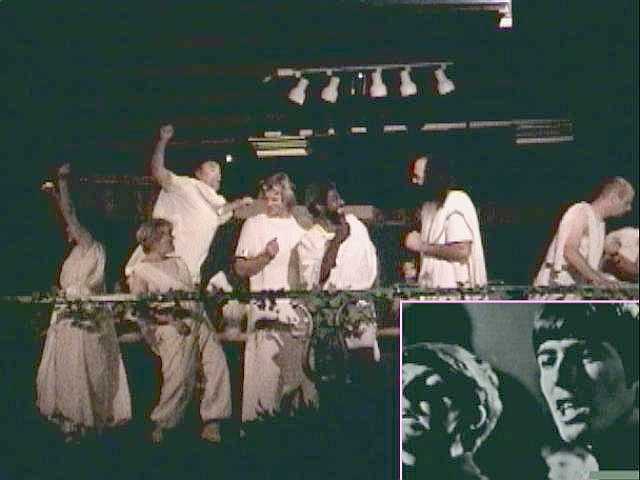| |
ORPHEUS ROX
MYTHOLOGY CHEAT SHEET

Orpheus and Eurydice
One of the most universal and misunderstood of all the world myths. Orpheus
is the son of Apollo, god of music, medicine, and prophecy, and
Calliope, one of the nine muses. He is endowed with such
prodigious musical talent that wild beasts, trees, and rocks are said
to have wept when he played for them.
Orpheus was a member of the legendary Argonauts, a group of mythic
heroes who sailed to the end of the world to retrieve the “Golden
Fleece.” On their return voyage, Orpheus saved the mission from
the treacherous Sirens by singing a song so powerful that the sailors
were not lured by the irresistible chants of the evil women.
Upon his return to Greece, Orpheus meets and marries the lovely Eurydice.
They are desperately in love, but, on their wedding day, a bizarre and
tragic series of events is set in motion. Aristaeus, lord of bees,
is smitten by Eurydice during the wedding celebration and he chases her
through a field where she is fatally wounded by a poisonous viper.
Orpheus is overcome with grief, but eventually resolves to venture into
the underworld to seek the release of his beloved. As he descends, he
charms Charon, the ferryman of the river Styx, and the vicious
three-headed dog, Cerberus, who guards the gates of Hades. His
magical music causes all suffering to cease, and he soon charms Persephone,
the Queen of the Underworld. She is so moved that she pleads with the
stonehearted Hades to let Eurydice be released. Eventually she
wins him over, but he imposes one simple condition. Orpheus must not look
at Eurydice until they have crossed back to the normal world again.
As they are taking the last step, Orpheus looks back and he looses Eurydice
for good. He retires once again to the woods in deep despair and sings
the saddest song the world has ever heard. In a neighboring meadow, a
group of Maenads-- wild women followers of the cult of Dionysus--
are holding one of their intoxicated, orgiastic celebrations. They notice
Orpheus and invite him to join in their dance, but his grief is all consuming,
and he doesn’t notice them. Enraged, they descend on him like the
Furies. They dismember and behead him, throwing his parts into the river.
The last image of Orpheus is his severed head, floating in the river,
still crying the name of his beloved Eurydice.

THE GODS
Zeus deposed his father, the Titan Cronus to become
the god of the sky and ruler of the Olympian gods. At the same time, Zeus
is described as falling in love with one woman after another and resorting
to all kinds of tricks to hide his infidelity from his wife, the jealous
Hera.
Apollo: Son of the god Zeus and Leto, daughter of a Titan.
In Homeric legend Apollo was primarily god of prophecy, and he
sometimes gave this gift to mortals whom he loved. Apollo was also god
of music, light and truth. He taught humans the art of healing.
He was also a master archer and a fleet-footed athlete, credited with
having been the first victor in the Olympian Games. Apollo was the special
protector of young men.
Dionysus, a son of Zeus, became the popular Greek god of wine
and cheer. He was also a deity whose mysteries inspired ecstatic,
orgiastic worship. The Maenads, or Bacchantes, were a group
of female devotees who left their homes to roam the wilderness in ecstatic
devotion to Dionysus at the orgia. These frenetic celebrations became
occasions for licentiousness and intoxication. Dionysus, who became Bacchus
in the Roman pantheon, was good to those who honored him, but he brought
madness and destruction upon those who spurned him or the orgiastic rituals
of his cult.
Athena sprang full-grown and armored from the forehead of the god Zeus
.
Athena was the goddess of the Greek cities, of industry and
the arts, and of wisdom; she was also goddess of war and protector
of heroes. She was born directly out of Zeus's forehead.
Hades: God of the dead, brother of Zeus and Poseidon. With his
queen, Persephone, whom he had abducted from the world above, he ruled
the kingdom of the dead. Although he was a grim and pitiless god, unappeased
by either prayer or sacrifice, he was not evil. The underworld itself
was often called Hades. It was divided into two regions: Erebus,
where the dead pass as soon as they die, and Tartarus, the deeper
region. It was a dim and unhappy place, guarded by Cerberus, the
three-headed, dragon-tailed dog. Sinister rivers separated the underworld
from the world above, and the aged boatman Charon ferried the souls
of the dead across these waters.
Hermes: Messenger of the gods. As the special servant and courier
of Zeus, Hermes had winged sandals and a winged hat and bore a golden
Caduceus, or magic wand, entwined with snakes and surmounted by
wings. He conducted the souls of the dead to the underworld and was believed
to possess magical powers over sleep and dreams. Hermes was also a dangerous
foe, a trickster, and a thief.
|
|

